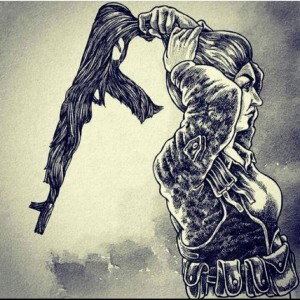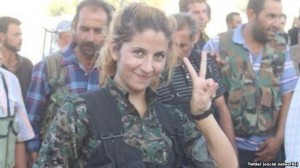
My first diigo post this week was a news report on the BBC about the peace talks between Turkey and the PKK. In this news article, a PKK commander claims that while the both sides leadership desires to move forward with the peace process, the peace talks with Turkey are in danger of turning into conflict. Cemil Bayik, a PKK commander in the Qandil mountains, says that the Turkish government’s treatment of Kobane shows that it still views the PKK and the Kurdish people as a bigger threat than ISIS. Meanwhile, a Turkish government official, Yasin Aktay, vice-chairman of the ruling AK Party, gave a statement saying that the PKK and the Kurds are using current time of instability to try to “upset the status quo”, and try to set up a system of self-governance like Iraqi Kurdish groups. This article ends with dire warnings by both sides. Aktay warns that in the coming weeks and months, Turkey will actively try to prevent a “power grab” by the PKK in Kurdish towns. Meanwhile, Cemil Bayik says that unless the Turkish government changes its policies, the conflict between the Kurds and Turkey will continue, asserting that “if necessary the Kurds will fight against the Islamic State and the Turkish army”. None of this bodes well for the peace process, and it seems like the next few weeks will bring only escalating conflict between the two groups. Kurdish groups continue to hold rallies in support of Kurdish fighters in Kobane in the Turkish capitol (pictured above). This article is fairly unbiased, and interviews leaders from both sides of the conflict, so it is difficult to say which perspective on globalization it holds.
My second diigo post this week was a news report about a speech Turkey’s President Ergodan made about gender equality. The Turkish President was subject to international criticism after his remarks at a gathering in Istanbul aimed at discussing women’s rights and freedoms, in which he said that gender equality is “against nature”. In his speech, Ergodan stated that Islam has defined a role for women in society, and that that role is motherhood. He also offered a strong admonishment to Turkish feminists, whom he says have rejected motherhood. Women’s and human’s rights activists have consistently criticized Ergodan and the AKP party since they came into power in 2003, claiming that Turkey has increasingly become authoritarian and politically conservative. While this article is not directly about the PKK and the Kurdish people, I thought it was important to address gender equality in Turkey, particularly as there is currently such debate about whether the PKK actually practices gender equality. According to World Economic Forum’s 2013 Gender Gap Index, Turkey is ranked 120th of 136 nations in gender equality. As this is an article in the Hurriyet Daily News, a Turkish newspaper, this article is certainly less critical of Ergodan than other articles I read about the same event. A good subject for my final paper would be comparing gender equality in the PKK and Turkey.



